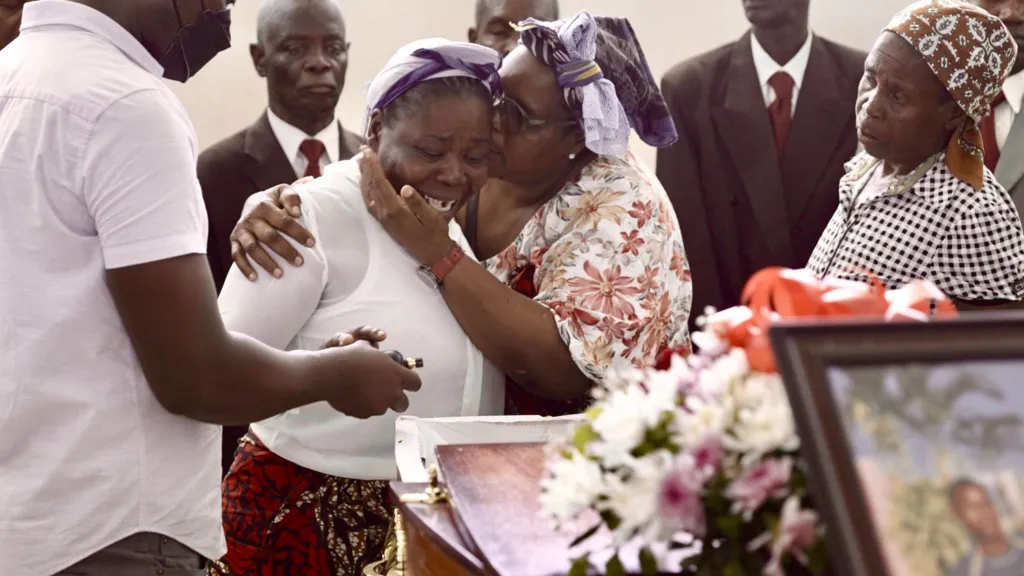Children shot dead after joining pot-banging protests in Mozambique
4 min read
Anthony Irungu / BBC
In Mozambique’s capital, Maputo, a group of young mourners gathered at a cemetery to bid farewell to a 16-year-old boy, Antonio Juaqim, who was tragically shot and killed during protests against the recent presidential election results. Antonio was among the children killed in violent confrontations with police after joining an opposition-led protest, where demonstrators banged pots and pans to express their dissatisfaction with the election outcome. Antonio’s uncle, Manuel Samuel, described the harrowing moment when the young boy was shot in the mouth, with the bullet exiting through the back of his head. CCTV footage from nearby shops reportedly showed police firing on protesters, including Antonio.
The political unrest in Mozambique has deepened since the ruling Frelimo party, which has held power for 49 years, was declared the winner of the presidential election. Frelimo’s candidate, Daniel Chapo, claimed a sweeping victory with 71% of the vote, far ahead of his nearest rival, Venâncio Mondlane, who garnered just 20%. Mondlane, an evangelical pastor who broke away from the main opposition party Renamo, has refused to accept the results, alleging the election was rigged. The election dispute has sparked widespread protests across the country, particularly from Mondlane’s supporters, many of whom are young and disillusioned with the current regime. Mondlane, who fled the country fearing arrest, has urged his followers to resist the result and demand a fair electoral process.
Since the election result was announced on October 24, protests have taken a distinct form, with people gathering at 9 p.m. every night to bang pots, pans, and bottles or blow whistles in defiance of Frelimo’s continued rule. This form of protest, which began on November 15, was initially seen as a peaceful and vibrant display of civil disobedience, with thousands taking to the streets. Antonio, however, tragically became one of the first casualties of this movement, and his death cast a shadow over the protests.
As the violence escalated, protests continued mostly inside people’s homes, with the nightly sounds of banged pots and pans echoing across the city. Antonio’s funeral on November 19 was attended by grieving friends, some of whom read a eulogy that highlighted the hope he represented before his life was violently cut short. One friend said, “You were so full of life and hope. Now you are a victim of a bullet.” During the ceremony at the São Francisco Xavier Cemetery, friends planted flowers on his grave and released colorful balloons, symbolizing his youth and the senselessness of his death.
Manuel Samuel, Antonio’s uncle, revealed that at the morgue, he counted six bodies of children who had been killed during the protests. “They are killing us and our future,” he said, expressing his grief over the loss of so many young lives. Human Rights Watch reports that at least 40 people have died in the post-election violence, including at least 10 children.
In response to the deaths, Mozambique’s police commander, Bernardino Raphael, expressed condolences to the families but blamed Mondlane’s supporters for using children as human shields. Raphael claimed that in many cases, the police were forced to act in self-defense, as protesters had reportedly killed six police officers and looted property. He added that 103 people had been injured, with 69 of them being police officers.
However, opposition leaders and analysts argue that the police used excessive force to suppress dissent. Albino Forquilha, leader of the Optimist Party for the Development of Mozambique, which supported Mondlane’s candidacy, accused the police of acting to protect the ruling party rather than maintaining law and order. Borges Nhamirre, an analyst from the Institute for Security Studies in South Africa, noted that Mozambique had never before experienced such a high number of casualties and property damage during protests, signaling a dramatic shift in the political landscape.
The protests, and particularly the deaths of young people like Antonio, underscore the deepening dissatisfaction among Mozambique’s youth. Many young Mozambicans, who face high unemployment and limited opportunities, are increasingly disillusioned with Frelimo’s long-standing rule. Nhamirre pointed out that these young people are not concerned with the historical achievements of Frelimo, such as independence from colonial rule. Instead, they are focused on economic independence, seeking jobs, vocational training, and better living conditions.
Following the election result, Chapo, the Frelimo candidate, remained largely silent, with the party maintaining that the election was fair and transparent. As Mondlane continues to rally his supporters through social media, calls for justice for the victims of police violence have gained momentum. On November 22, Mondlane’s followers also observed a three-day mourning period, during which they stopped their vehicles at noon and honked their horns in solidarity with the dead.
The tragic deaths of Antonio and others like him are a painful reminder of the political instability that continues to grip Mozambique. As the country navigates one of its most turbulent periods since the advent of multi-party democracy three decades ago, it remains to be seen whether justice will be served for the victims and whether the demands for reform will be heard by the authorities.







